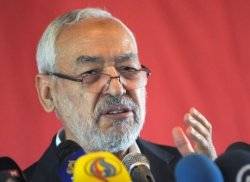Tunisia coalition government agrees to resign
29/09/2013| IslamWeb
Tunisia's Islamist-led coalition government has agreed to resign in an attempt to resolve a political crisis sparked by the assassination of a leading opposition figure.
The Ennahda Party agreed on Saturday to resign after negotiations that could start next week with secular opponents to form a non-partisan, caretaker administration and prepare for new elections.
Officials said the resignation should happen once the major parties along with the UGTT labor union agree on a roadmap for the new government, its make-up and its mandate and a timetable for the election.
The talks aim to end weeks of crisis involving the government and opposition parties that threatened to derail the transition to democracy in the North African country where the uprisings began in 2011.
The UGTT , mediating between the two sides, proposed the ruling Ennahda agree to three weeks of negotiations, after which it would step down and make way for an independent transitional administration and set a date for parliamentary and presidential elections.
No conditions
Lotfi Zitoun, an Ennahda party official, said the dialogue would start on Monday or Tuesday.
"Ennahda has accepted the plan without conditions to get the country out of the political crisis," Zitoun said.
The assassination of opposition leader Mohamed Brahmi on July 25 plunged Tunisia into political turmoil. Dozens of opposition politicians quit amid street protests, freezing efforts to write a new constitution.
The union, opposition, lawyers and human rights advocates said Ennahda's inability to ensure security led to the killings of the opposition figure in July along with another one last February.
The ruling party issued strong condemnations of the killings, and denied any role in them.
PHOTO CAPTION
Leader of ruling Islamist party Ennahda, Rached Ghannouchi, speaks at a press conference on August 15, 2013 in Tunis.
Aljazeera

